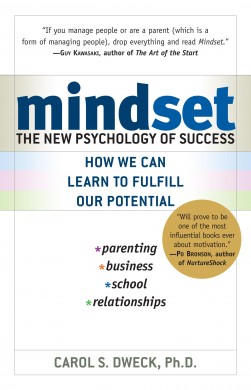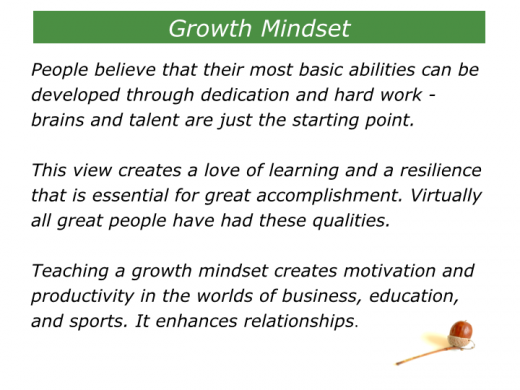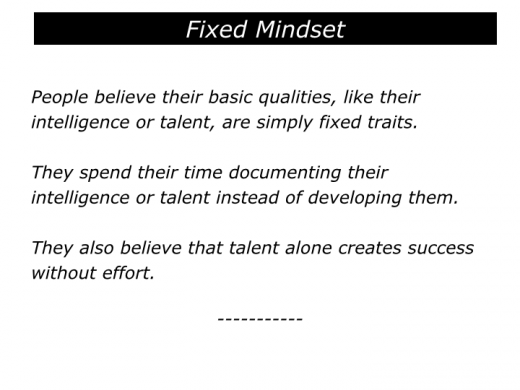Carol Dweck has done pioneering work on the difference between growth mindsets and fixed mindsets. Here is an overview of these two concepts.
Growth Mindset
People with a growth mindset believe they can develop their brain, abilities and talent through hard work, says Carol.
Such people embrace a love of learning and resilience. This creates a love for learning, a drive for growth and a resilience that is essential for great accomplishments.
Fixed Mindset
People with a fixed mindset believe their abilities are fixed and cannot be developed.
Such people also believe that talent alone creates success, says Carol. They see effort as a sign of weakness rather than as a positive element of life needed to reach one’s full potential.
There is an important point to remember regarding mindsets. A person may demonstrate a growth mindset when doing certain activities but not when doing others.
This is crucial to bear in mind when aiming to identify a person’s strengths. When focusing on the activities they find fascinating, a person may go through the stages of absorption, adventure and achievement.
People who are pragmatists, for example, want to know the point of what they are going to learn. If they can see how the skill can be used, then they will apply themselves fully. Otherwise they may not show any interest.
Helping People To
Develop A Growth Mindset
So how can you help a person to develop a growth mindset? Carol and her colleagues have found that much depends on:
The kinds of encouragement that people are given during the lives.
They did many experiments to test the effects of praising children in different ways after the children had, for example, completed a puzzle.
One group of children were praised for their attitude and application. They were told things like:
“That’s a really good score. You must have tried really hard.”
Another group of children were praised for just for their natural abilities. They were told things like:
“That’s a really good score. You must be smart at this.”
Researchers found that the first group were more likely to develop a growth mindset. The second were more likely to develop a fixed mindset.
Certainly ability is vital, but Carol’s findings have implications for the way we encourage people. Encouragement calls for focusing on the characteristics people demonstrate to achieve their goals rather than simply saying they are clever.
Enjoying The Journey As
Well As Reaching The Goal
Carol believes that people with a growth mindset love the process of learning and developing. She writes:
“The growth mindset does allow people to love what they’re doing – and to continue to love it in the face of difficulties.
“The growth-minded athletes, CEOs, musicians, or scientists all loved what they did, whereas many of the fixed-minded ones did not.
“Many growth-minded people didn’t even plan to go to the top. They got there as a result of doing what they love.
“It’s ironic: The top is where the fixed-mindset people hunger to be, but it’s where many growth-minded people arrive as a by-product of their enthusiasm for what they do.”
You can discover more via the following links. These provide an introduction to the philosophy and also practical tools that people can use to develop a growth mindset.
https://business-essay.com/blog/fixed-vs-growth-how-your-mindset-dictates-your-success-infographic/
https://www.mindsetworks.com/science/
Here is a link to a podcast on the JRNI website describes how coaches can use aspects of the growth mindset approach.
https://www.jrni.co/blog/coaching-podcast-growth-mindset-vs-fixed-mindset-as-a-coach

John Wooden’s Approach
To Ongoing Development
Carol describes many great teachers in her book Mindset. One of these is the great John Wooden.
Despite being the most successful College Basketball Coach in American history, he never talked about winning. Instead, he urged his players ‘to do their best every day.’ She writes:
“Wooden is not complicated. He’s wise and interesting, but not complicated. He’s just a straight-ahead growth-mindset guy who lives by this rule:
“‘You apply yourself each day to becoming a little better each and every day over a period of time, you will become a lot better.’
“He didn’t ask for mistake-free games. He didn’t demand that his players never lose. He asked for full preparation and full effort from them.
“‘Did I win? Did I lose? Those are the wrong questions. The correct question is: Did I make my best effort?’
“If so, he says, ‘You may be outscored but you will never lose.’”
Carol believes that people who develop a growth mindset can increase their ability to deliver. People who apply this attitude can enjoy the journey as well as a sense of achievement.




Leave a Reply